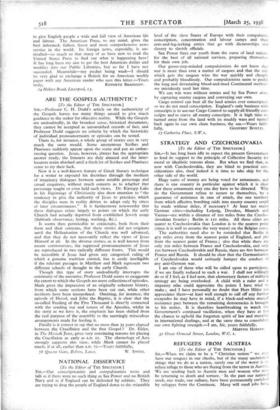ARE THE GOSPELS AUTHENTIC ?
[To the Editor of THE SPECTATOR.]
SIR,—Professor C. H. Dodd's article on the authenticity of the Gospels leaves too many things unsaid to give much guidance to the seeker for objective reality. While the Gospels are undoubtedly, in the broadest sense, historical documents, they cannot be accepted as unvarnished records of fact, and Professor Dodd suggests no criteria by which the historicity of individual pronouncements or episodes can be tested.
There is, for instance, .a whole group of stories cast in very much the same mould. Some anonymous Scribes and Pharisees suddenly appear upon the scene and put an embar- rassing question. Jesus, however, always has the appropriate answer ready, the listeners are duly amazed and the inter- locutors retire abashed until a fresh lot of Scribes and Pharisees come to try their luck.
Now it is a well-known feature of Greek literary technique for a writer to expound his doctrines through the medium of imaginary dialogues between some notable personage and casual enquirers, without much concern as to whether that personage taught or even held such views. Dr. Kirsopp Lake in his Beginnings of Christianity also drew attention to "the tendency to give the authority of Jesus to practicei which the disciples were in reality driVen to adopt only by stress of later circumstances." It is furthermore noteworthy that these dialogues relate largely to points on which the early Church had actually departed from established Jewish usage (Sabbath observance, fasting, washing, &c.).
It seems then permissible to conjecture, both from their form and their contents, that theie stories did not originate until the Hellenisation of the 'Church was well advanced, and that they do not necessarily reflect the views of Jesus Himself at all. In the divorce stories, as is well known from recent controversies, the supposed pronouncements of Jesus are reproduced in two radically different forms. This would be incredible if Jesus had given any categorical ruling of which a genuine tradition existed, but is easily intelligible if the relevant passages in Matthew and Mark represent two different schools of thought in the early Church.
Though this type of story undoubtedly interrupts the continuity of the narrative, Professor Dodd seems to exaggerate the extent to which the Gospels are mere collections of episodes. Mark gives the impression of an originally coherent history, from which some sections have been cut out, while other incidents have been interpolated. Omitting, for instance;the episode of Herod, and John the Baptist,' it is clear that the so-called Feeding of the Five Thousand is direoly connected with the sending out and return of the Apostles, whilst in the story as we have it, the emphasis has been shifted from the real purpose of the assembly to the seemingly miraculous arrangements made for feeding it.
Finally is it correct to say that no more than 35 years elapsed between the Crucifixion and the first Gospel ? Dr. Eisler, in The Messiah 3esus, gives very convincing reasons for placing the Crucifixion as early as A.D. Zr. The chronology of Acts strongly supports this view, while Mark cannot be placed much, if at all, earlier than A.D. 70.—Yours faithfully, 78 Queens Gate, Bolton, Lancs. W. SMITH.










































































 Previous page
Previous page